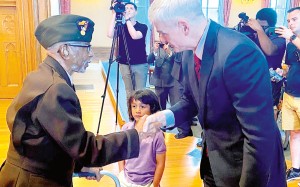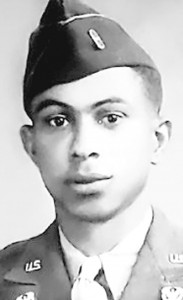Black veteran awarded Purple Heart 77 years after service
6th July 2021 · 0 Comments
By Ryan Whirty
Contributing Writer
On June 6, 1944, Johnnie A. Jones Sr. was a warrant officer – the first African American to receive that designation in Army history – in the 494th Port Battalion in the Fifth Engineering corps as part of the third wave of troops charging the shores of Normandy on D-Day.
Jones had gone from the campus of Southern University and A&M College in Baton Rouge, where he was studying to be an attorney, to the beaches of Normandy, where he was one of thousands of Allied soldiers who crossed the English Channel and attacked stout, entrenched German defenses in the largest military invasion in world history.
Attempting, and eventually succeeding, to liberate France from German Nazi rule shoulder to shoulder with other Americans, Jones – a scrappy GI from Laurel Hill, La. – witnessed, and went through, hell.

World War II veteran Johnnie Jones shakes the hand of U.S. Sen. Bill Cassidy on Saturday, June 26, 2021, during a ceremony where he was presented the Purple Heart, which is awarded to veterans wounded on the battlefield during combat.
Photo courtesy of Facebook
“That first and second wave was almost completely annihilated,” Jones Mary Hebert of LSU said in a 1993 interview for the T. Harry Williams Center for Oral History. “… I saw all of them just get wiped out as we went in.”
His unit landed at Omaha Point, a section of beach codenamed “Dog Red.”
“That’s where we went in,” he said in the interview. “I went in right there, D-Day… My ship that I crossed [the] Channel on was [USS] Francis C. Harrington. … That ship was hit [by a] mine … I believe it was 25 that was killed instantly on [the] Francis C. Harrington.”
Jones survived the attack but was hit in the neck by a piece of shrapnel. But he pushed on without treatment – military officials failed to remove it – and continued the arduous task of fighting the Axis in Europe through the rest of 1944.
However, the grueling rigors of battle weren’t the only challenge facing Jones and his fellow Black soldiers. During World War II, the United States military remained segregated, and in the early stages of the U.S. involvement in the conflict, the vast majority of Black troops were kept out of combat.
Instead, they were used in support roles, like quartermastery, driving transport trucks, clerical work and construction.
But soldiers of color wanted to fight on the front lines, just like white GIs.
“Well, Black soldiers… Blacks could nationwide complain,” he told Hebert. “Like the NAACP and all of that … they complain about not being put into a [combat] unit. They complain about the fact that the picture was painted to believe that Black soldiers was noncombatant when they were. They didn’t complain about being put in the service unit because… because we understood.”
Black soldiers, including Jones, were denied advancement or other recognition, both during their active hitches and as veterans. For Jones, such disrespect stung and that feeling prompted him to embark on an illustrious, trailblazing career as a civil rights attorney in Louisiana. After graduating from Southern, he was recruited by the state’s early civil rights leaders to help lead the 1953 bus boycott in Baton Rouge that laid the foundation for the rest of the equality and desegregation movement. Braving death threats and surviving assassination attempts, Jones distinguished himself for his courage and commitment for the second time in his life.
On June 26, roughly 77 years after being wounded during one of the most important, heroic events in world history, the now 101-year-old Jones finally received his Purple Heart medal for his gallant, life-changing sacrifice on behalf of a flawed country that often viewed him as a second-class citizen.
In a ceremony held at the Old State Capitol in Baton Rouge, Jones was adorned in his full Army uniform and surrounded by loved ones and well wishers as he received the award given to those Americans who have been wounded in battle.
The medal was pinned on Jones’ uniform by U.S. Sen. Bill Cassidy, who then lauded the centenarian for his life-long devotion to freedom, justice and equality.
“Johnnie Jones fought to liberate the people of France, led civil rights efforts at home, and selflessly represented his community,” Cassidy said, according to a press release from the senator’s office. “Thank you for your service to this country. It’s an honor to present such a well-deserved honor to this great man.”
Upon learning that Jones had never received a Purple Heart for his injury sustained at Normandy – an insulting omission that was further compounded in the years after the war when the military initially refused to remove the shrapnel – Cassidy worked to set the bureaucratic gears in motion to at long last recognize Jones for the veteran’s sacrifice more than seven decades before.
“Here’s a man who could be bitter, but he speaks only of affection and he speaks not of himself, but his love of our state and of our nation and his desire that everyone have the same opportunity to enjoy the blessings of the state in nation,” Cassidy told those in attendance at the ceremony, according to reports.
A letter to Jones from Army Chief of Staff Gen. James McConville was also read during the ceremony.
“I want to express our deepest respect for your distinguished service, and long overdue recognition of your wounds received during the invasion of Omaha Beach on D-Day,” wrote McConville. “We owe you a debt of gratitude, both for your sacrifices during World War II and for being a role model for African Americans aspiring to serve. We serve to honor your legacy.”
At the ceremony Jones also was presented his juris doctorate degree from Southern University Law Center Chancellor John Pierre.
A June 26 blog post on the U.S. Department of Veterans Affairs Web site quoted Jones’ thoughts on receiving the Purple Heart.
“This is for my children, and my grandchildren, and any young people who want to listen to me,” Jones said. “I love talking to young people, because you cannot hide the past. You have to deal with the past, and you have to deal with history. You have to read and understand so we don’t repeat the past.”
In 2020, Jones, was honored in New Orleans by Vincent Sciama, the Consul General of France in Louisiana, with the rank of Chevalier in the Legion d’honneur, a prestigious award bestowed by the country the Jones helped liberate in 1944-45.
“[World War II] gave me courage, and I realized that a lot of places in this country needed to change,” Jones told The Louisiana Weekly at the time. “We sacrificed all we had in the war, and when we were denied our rights for so long, we didn’t let that stand in our way.”
In a 2019 interview with The Associated Press, Jones said his experiences in the military were bittersweet; while he was proud of his rugged bravery in France, he also was the subject of racism, bigotry in an American military that, while fighting for democracy abroad, was also enforcing segregation within its own ranks.
That experience, Jones said, helped spur him to become a civil rights lawyer.
“I couldn’t sit with the soldiers I had been on the battlefield with. I had to go to the back of the bus,” he told the AP. “Those are the things that come back and haunt you.”
But when it mattered the most on the battlefield, when the fate of global democracy hung in the balance in June 1944, every soldier plunged into the heart and heat of history.
“Everything [all units] was going in,” Jones told Hebert in 1993. “… all of them came in. They were all white, black and everything.”
Jones told Hebert that, hopefully, his shining service as a Black soldier served as an inspiration for younger generations of people of color, just like his civil rights work did.
“Believe it or not,” he said, “they have some [Black] Louisianans … who want to make the military a career because they [were] seeing that (his service). I was the role model for them. They have told me that.”
This article originally published in the July 5, 2021 print edition of The Louisiana Weekly newspaper.



